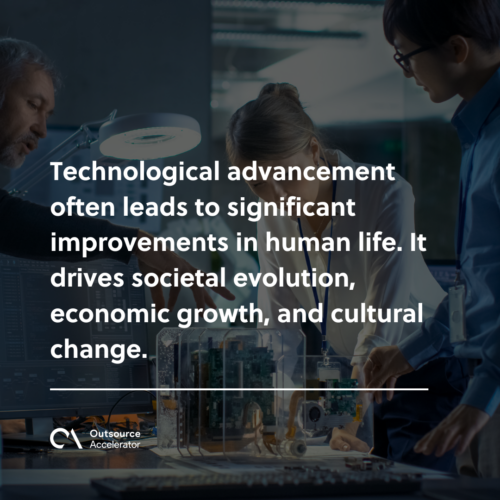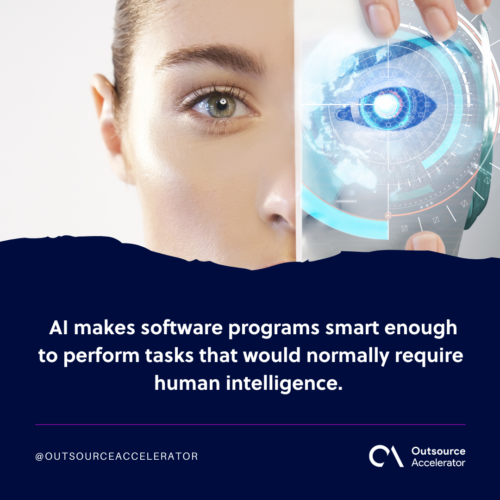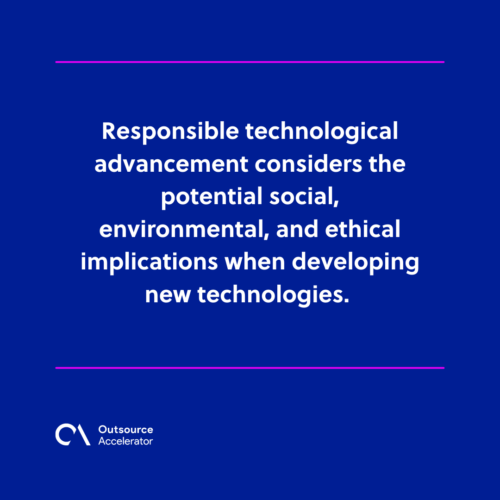How technological advancement changes society

Technological advancements continuously shape every aspect of our lives.
From revolutionary breakthroughs in artificial intelligence to the seamless integration of smart devices in our homes, technology continues to push boundaries and redefine what is possible.
This article delves into the realm of technological advancement, exploring the latest innovations and their impact on various industries and society as a whole.
Get inspired by how this progress transforms how we live, work, and interact with the world around us.
Technological advancement refers to the continuous progress and improvement of various emerging technologies and their applications over time.
It involves the development of new and innovative ideas, methods, tools, and systems that enhance efficiency and capabilities. The process of technological change is dynamic and ongoing. It does this for both existing technologies and new ones it introduces.
Technological advances often lead to significant improvements in everyday life. It drives societal evolution, economic growth, and cultural change.

Historical perspective on technological advancement
Human civilization has been shaped and propelled forward by a series of technological innovations throughout history.
Technological innovation revolutionizes how we live, work, and interact with the world, from the simplest tools to the most complex machines.
Early innovations that shaped human civilization
The roots of technological advancement can be traced back to the earliest days of human existence. Our ancestors wielded stone tools and developed equipment to aid in their daily lives.
Later, metalworking allowed people to create more durable tools and weapons, leading to the rise of advanced societies and civilizations.
Industrial Revolution: Its technological implications
The 18th and 19th centuries witnessed one of the most transformative periods in history – the Industrial Revolution.
This era marked a shift from agrarian and handcraft-based economies to industrialized, mechanized, and factory-driven societies. The introduction of new manufacturing technologies revolutionized production and transportation.
20th century: Technological growth
The 20th century marked an explosion of extraordinarily fast technological change, drastically affecting systems all over the world.
The advent of electricity changed communication, transportation, and entertainment. Automobiles, airplanes, and telecommunications brought people and nations closer like never before.
The rise of computing and information technology was a defining moment, laying the groundwork for the digital age. The Internet revolutionized how information was accessed and shared globally.
These extraordinarily beneficial innovations brought us into a new era.
In conclusion, this historical perspective on all those technologies shows us that human progress has been intricately linked to our ability to innovate and create.
As we move forward in the 21st century, we must reflect on our history and use our knowledge to navigate the challenges and opportunities ahead.
Key drivers of technological advancement
Technological advancement is propelled by a combination of factors that drive innovation, research, and development. These key drivers collectively contribute to the rapid evolution of technology and its integration into society.
Here are some of the primary drivers of technological advancement:
Research and development
Research and development (R&D) is one of the most important sources of technological advancement. It’s a systematic and scientific approach to acquiring new knowledge.
During this process, different ideas are experimented with. If an idea is found to be promising, it is further developed into a product or service that can be marketed.
R&D involves basic research, applied research, and experimental development. It also includes other activities that precede the development of new technologies, such as product design and process planning.
Governments encourage R&D projects through grants, tax incentives, and subsidies. Many private organizations also support R&D, frequently through universities and research institutes.
Globalization and collaboration
Globalization and collaboration have been major driving forces behind the convergence of technologies, industries, and economies.
The rise of the Internet has made it possible for people worldwide to collaborate on projects and share ideas. Technology allows us to communicate faster than ever and access information from anywhere.
As technological advancement has shown, when people work together toward a common goal, they can accomplish amazing things that they could never do alone.
Technological competition
Technological competition motivates businesses to improve their technologies, keeping up with other firms and providing customers with better products.
Technological competition can be internal (within a company) or external (between companies). Businesses must understand this concept to explain why campaigns fail or succeed.
Organizations must constantly strive for technological advancement to remain competitive with others.
Consumer demand and market trends
As consumers, we want more convenience and efficiency in our lives. This drives companies to develop new technologies that will help us reach that goal.
This is especially true in the consumer electronics industry, where manufacturers must constantly innovate to stay competitive and capture market share in this digital age.
Crises and challenges
Crises or challenges have always driven innovations. Global problems like health pandemics or environmental concerns can drive technological advancements as society seeks solutions to mitigate and adapt to these hurdles.
Transformative technologies in the modern era
The modern era has witnessed the emergence of increasingly rapid innovation that has reshaped industries, societies, and daily life.
Here are some of the major transformative technologies of the modern era:
Artificial intelligence and machine learning
The study of artificial intelligence aims to emulate human behavior in computers. AI makes software programs smart enough to perform tasks that would normally require human intelligence.
Machine learning is a subset of AI. Computers are trained using data to predict outcomes based on relationships between variables.
Human-level artificial intelligence is the goal of many tech companies.

Internet of Things
The Internet of Things is a network of physical devices, vehicles, and buildings. These are embedded with electronics, software, sensors, and networks that enable the collection and exchange of data.
The IoT network opens up possibilities for a closer integration of computer-based technologies with the physical environment.
Virtual and augmented reality
Virtual reality simulates a three-dimensional image or environment through computer generation. It artificially creates sensory experiences, which can include sight, touch, hearing, and smell.
Augmented reality provides a live view of a physical, real-world environment. It allows for an interactive experience using “augmented” computer-generated imagery.
Biotechnology and genetic engineering
Biotechnology deals with the use of living organisms for industrial production, medical purposes, and research.
Genetic engineering is a method of manipulating an organism’s genes to produce desired characteristics. It has applications in research, medicine, agriculture, and industry.
Renewable energy technologies
Renewable energy technologies are those that can be generated from natural resources. These resources are replenished through natural processes or by harvesting naturally occurring materials.
These energy resources help reduce greenhouse gas emissions and provide a cleaner environment for future generations.
New renewable energy technologies include:
- Advanced biomass gasification
- Biorefinery
- Biofuels
- Solar heating and cooling
- Geothermal energy
- Hydroelectricity
- Wind power
Impact of technological advancement on industries
Technological advancement has had a profound impact on various industries. Technological integration has brought about increased efficiency, improved products and services, and enhanced customer experiences across different sectors.
Let’s explore the impact of technological advancement in some prominent industries:
Technological advancement in health
Technological advancement in the health industry has led to improved diagnostics, treatments, and patient care.
- Medical imaging technologies such as MRI and CT scans allow for more accurate diagnoses.
- Telemedicine enables remote consultations, enhancing access to healthcare services.
- Robotic surgery systems offer greater precision in surgical procedures.
- Personalized medicine tailors treatments based on genetic information, optimizing effectiveness.
Overall, technology has enhanced patient outcomes, streamlined healthcare processes, and expanded healthcare access.
Technological advancement in business
Technological advancement has revolutionized how businesses operate and interact with customers.
- Digital transformation has streamlined operations, from supply chain management to customer relationships.
- E-commerce platforms and online marketplaces have expanded global reach and personalized shopping experiences.
- Data analytics and AI-driven insights inform strategic decision-making.
- Automation and robotics improve efficiency in manufacturing and other sectors.
- Cloud computing facilitates remote work and collaboration.
Businesses have become more agile, responsive, and customer-focused.
Technological advancement in communication
Technological advancement has transformed communication, enabling real-time global connectivity.
- Internet and mobile technologies have revolutionized how people interact, from instant messaging to video conferencing.
- Social media platforms have reshaped how individuals and businesses engage with each other.
- 5G technology promises faster data speeds and enhanced connectivity, paving the way for new communication possibilities.
Overall, technology has brought people closer, breaking down geographical barriers and fostering information exchange.
Technological advancement in entertainment
Technological advancement has dramatically changed the entertainment landscape.
- Streaming services have replaced traditional TV and cinema experiences, offering on-demand consumption.
- Virtual and augmented reality provides immersive gaming and interactive experiences.
- AI-driven content recommendations personalize entertainment choices.
- Digital platforms have empowered creators to share their content directly with audiences.
Entertainment has become more accessible, interactive, and personalized.
Technological advancement in energy and environment
Technological advancement in energy and the environment has focused on sustainability and efficiency.
- Renewable energy technologies have increased clean energy generation.
- Smart grids optimize distribution and consumption.
- Energy-efficient appliances and buildings reduce resource consumption.
- Environmental monitoring aids in pollution control.
Overall, technology reduces carbon emissions, conserves resources, and addresses environmental challenges.
Responsible technological advancement
Responsible technological advancement considers the potential social, environmental, and ethical implications when developing new technologies.
It involves a thoughtful and balanced approach to innovation. The process doesn’t just focus on technological progress but also on ensuring that its outcomes are beneficial and sustainable for individuals, communities, and the broader ecosystem.

Key characteristics of responsible technological advancement include:
- Ethical considerations – This ensures that technologies respect human rights, promote equity, and avoid harm.
- Sustainability – This takes into account technology’s ecological impact, striving for environmentally friendly solutions.
- Transparency and accountability – Developers and stakeholders must be transparent about any capabilities, limitations, and potential risks, while taking responsibility for any negative consequences.
- Inclusivity – Technology should be designed with inclusivity in mind, ensuring accessibility for diverse populations.
- Privacy and data security – This safeguards user information from unauthorized access and misuse.
- Regulatory compliance – Technologies must adhere to relevant laws, regulations, and standards.
- Human-centered design – Responsible technological advancement focuses on enhancing human well-being and improving quality of life.
Responsible technological advancement prioritizes human welfare and the common good. By embracing this approach, technology creators and users contribute to a more sustainable and equitable future.
There are still many future innovations to be made, and it’s important we make them safely as a society.







 Independent
Independent




